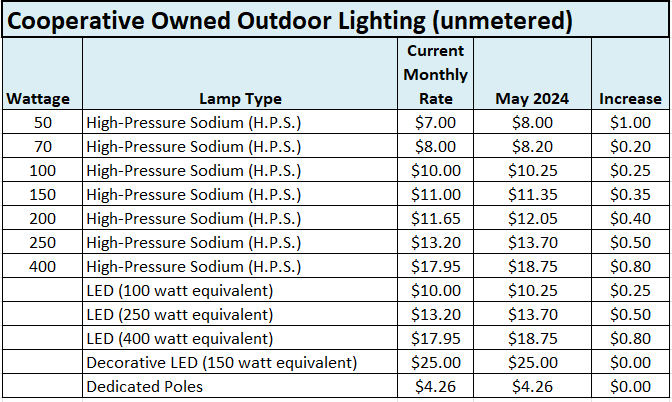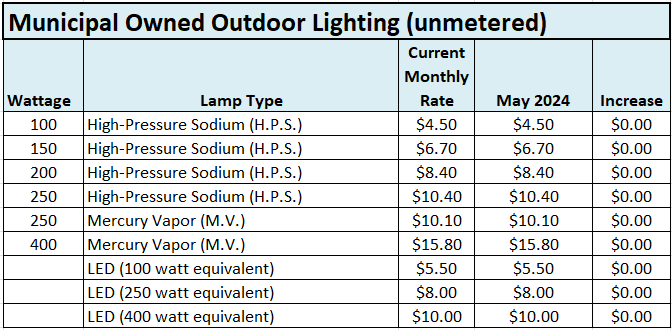Beginning tomorrow morning, Tuesday, February 24 at 7:00 a.m. For more info visit Peak Energy Alert.
Toll Free: (800) 214-2694 | Pay by Phone: (844) 965-1335
Beginning tomorrow morning, Tuesday, February 24 at 7:00 a.m. For more info visit Peak Energy Alert.
To RSVP for the 89th Annual Meeting, click here.
Toll Free: (800) 214-2694 | Pay by Phone: (844) 965-1335
Pay Now | Power Outages | Contact Us | Search
At People's Energy, we strive to provide members with reliable electric service at fair and reasonable prices which meets or exceeds industry standards for availability, quality, and continuity. Rates at People’s Energy Cooperative reflect the true cost of generating and delivering electricity to members. These rates ensure dependable service, ongoing infrastructure improvements, and support for the cooperative’s long-term sustainability.
Effective May 1, 2025
| Rate | Details |
|---|---|
Residential Service - Rural Includes: residential homes or apartments outside of an incorporated city | Basic Service Charge: $61.50/month Energy Charge: |
Residential Service - Urban Includes: residential homes or apartments within the boundaries of an incorporated city | Basic Service Charge: $41.00/month Energy Charge: |
General Service with Electric Heat
| Basic Service Charge: $61.50/month Energy Charge: |
Electric, Shared/Community Water Well and Septic
| Basic Service Charge: $24.00/month Energy Charge: |
Optional Residential Demand Service
| Basic Service Charge: $41.00/month Energy Charge: Demand Charge: |
| Rate | Details |
|---|---|
Small General Service Includes: farms, small grain bins or dryers, and small to medium-sized businesses | Basic Service Charge: Energy Charge: |
General Demand Service Includes: farms, large grain bins or dryers, large-sized farms, medium to large size business, and industrial operations
| Basic Service Charge: Energy Charge: $0.06300/kWh Demand Charge: |
Controllable Seasonal Rate Available to members with seasonal energy use requiring at least a 70 KVA transformer
| Basic Service Charge: $140/month Energy Charge: $0.05910/kWh Demand Charges: Seasonal Demand Charge When Load Control is Requested: |
Peak Alert Interruptible Available to members where their monthly maximum demand will or has exceeded 20 kW for at least once annually and the member has the ability to maintain their system's operation during periods of load control through the use of a standby generator
| Basic Service Charge: $140/month Energy Charge: $0.05910/kWh Demand Charges: Seasonal Demand Charge when Load Control is Requested: |
Cooperative owned, outdoor, dusk to dawn, unmetered lighting.

This rate includes installation, maintenance, and electricity with installation on an existing pole where 120 volts (secondary distribution facilities) is available ahead of the member's metering. All outdoor lighting fixtures shall be owned, maintained, and operated by the Cooperative.
Municipal owned, outdoor, dusk to dawn, unmetered lighting.

The Cooperative will furnish all electric energy required to operate the municipality's street lighting system. All maintenance shall be the responsibility of the municipality.
*Holidays are New Year's Day, Memorial Day, Independence Day, Labor Day, Thanksgiving Day, and Christmas Day
| Rate | Details |
|---|---|
Optional Residential Time-of-Use Includes: residential homes or apartments
| Basic Service Charge: Energy Charge: Definition of Peak Periods: |
Optional Electric Vehicle Charging Time-of-Use Includes: electric vehicle charging
| Basic Service Charge: Energy Charge: Definition of Peak Periods: |
Optional General Service with Demand Time-of-Use Includes: single or three-phase general service, 60 Hz, at available secondary voltages
| Basic Service Charge: Energy (kWh) Charge: Demand (kW) Charge:
Winter (Other months and all weekends and holidays*)
*Holidays are New Year's Day, Memorial Day, Independence Day, Labor Day, Thanksgiving Day, and Christmas Day. |
| Rate | Details |
|---|---|
On-Peak Electric Space Heating (Closed - not available to new applications) Available for: separately metered, single-phase residential service for the primary purpose of heating with electricity | Basic Service Charge: $7.00/month Energy Charge: |
Off-Peak Electric Space Heating Available for: separately metered, single-phase service, which has utility approved electric space heating equipment at least 8 kW. | Basic Service Charge: $7.00/month Energy Charge: $0.06200/kWh |
Off-Peak Electric Vehicle Charging Available for: separately metered, single-phase service, which has utility approved hard-wired, level two electric vehicle charger | Basic Service Charge: $7.00/month Energy Charge: $0.06200/kWh |
Electric Vehicle Fast Charging Available for: non-residential, Level 3 electric vehicle charging facilities with capacity of 50kW or more | Basic Service Charge: Energy Charge: |
Electric Vehicle Charging Subscription Rate This optional incentive pilot rate is available and limited to 50 residential members for separately metered, level-2 hard-wired, electric vehicle charging.
| Subscription Charge: Energy Charge: Definition of Peak Periods: |
Dual Fuel Space Heating Available for: separately metered, controlled dual electric space heating where electric service is also used for lighting or other purposes
| Basic Service Charge: $7.00/month Energy Charge: |
Off-Peak Electric Water Heating Available for: single-phase general service under a single-phase rate schedule, which has utility approved electric water heating equipment of at least 80 gallons, subject to the established rules and regulations of the Cooperative | Basic Service Charge: $7.00/month Energy Charge: $0.06200/kWh |
The Basic Service Charge accounts for the majority of the Cooperative's investment in poles, wires, transformers, and equipment to provide members with electric service. It supports fleet, facility, and member service functions, such as outage response, line maintenance, member service support, and administrative responsibilities.
The Energy Charge is calculated based on the metered kilowatt-hours (kWh) consumed during the billing period. The energy used to calculate this charge is also known as a member's usage.
The Demand Charge is determined by the highest amount of power, measured in kilowatts (kW), recorded by the meter during a designated period of time. This measurement resets each billing period. The charge is calculated by taking that measurement times the rate based on the time of year.
The Power Cost Adjustment reflects the increases or decreases in the Cooperative's cost to purchase and distribute wholesale power.
PEC's member-elected Board of Directors and executive staff continuously monitor the financial stability of the organization to determine if a rate change is necessary based on a class cost of service study.
The Board of Directors then decides what the rates will be based on the following rate making principles:
Rate design is a balancing act between meeting revenue needs while minimizing the overall financial impact to members.
As a not-for-profit organization, it is necessary to recover the costs of doing business, as well as maintain enough cash reserves (margins) to reinvest in the system.
Therefore, it is important to 1) evaluate the cost of providing service to members, 2) determine the revenue required to cover the costs, and 3) charge rates that ensure the required revenue is collected. The process involves completing a cost of service study which is typically done every three to five years.
The study, completed by an independent and experienced firm, evaluates costs and identifies the total revenue requirement for the Cooperative. The costs are allocated appropriately based on classifications such as residential, commercial, and industrial which are based on the type of service, equipment, infrastructure, and the capacity required to provide service. The results of the cost of service study are then used as a tool to design rates.
Typically, members are on a rate for 12 consecutive months before being moved to another rate. There can be exceptions to this, like when a major load is added to your service, qualify it for a new rate.
To the electric utility, demand represents the amount of electrical power that must be available to consumers at any given time.
To learn more about demand and how it affects the electrical grid, click below.
The charge ensures that member expectations for continuous power and outstanding customer service are met.
It provides the funds required to maintain the quality, reliability, and integrity of services that our members count on and have come to expect. The expenses include items such as:
Because all cooperative members benefit from having reliable electric service available when they want it, the basic service charge ensures that everyone pays their fair share of the basic costs - fixed costs that exist whether or not a single kWh is used.
All electric utilities are different. PEC serves rural area, has low consumer density, and few large industrial members to distribute the financial load.
For example: PEC serves an average of just over eight consumers per mile of electric line equaling nearly $19,000 of revenue per mile of line. RPU's average is 69 consumers per mile of line with average revenue over $207,000 per mile of line. Regardless of consumer density, PEC is committed to meet each member's needs and expectations for reliable electric service.
Legacy
A service location within PEC service territory that was served by the Cooperative prior to the Alliant acquisition. Billing statements for these accounts have green colored headings.
SMEC
A service location within PEC service territory that was acquired from Alliant Energy in 2015. The billing statements for these accounts have blue colored headings.
NOTE:
Dairyland Power Cooperative is the power provider for legacy members and Alliant Energy is the provider for SMEC members.
The Cooperative has several options to help members manage electric costs. Services include energy management programs to help manage electric usage as well as flexible payment options such as budget billing and a pre-pay option. The first step is knowing how much energy you are consuming. This data is available through SmartHub.
Members can find helpful information about conserving energy on Energy Saving Resources.
